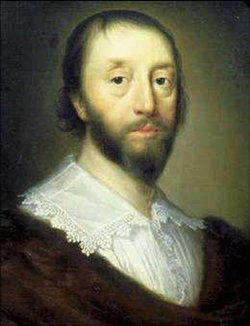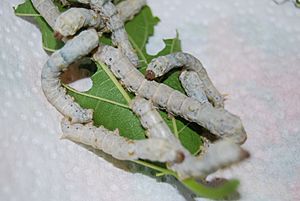Edward Digges facts for kids

Edward Digges (born February 14, 1620 – died March 15, 1675) was an English lawyer and colonist. He became the Colonial Governor of Virginia from March 1655 to December 1656. Edward was the son of a famous English politician named Dudley Digges. He was very interested in growing mulberry trees and trying to start a silk industry in the Virginia colony. Because of his efforts, he was made the auditor-general of Virginia.
Contents
Who Was Edward Digges?
Early Life in England
Edward Digges was born in Chilham Castle, Kent, England. He was christened on March 29, 1620. He was the fourth son of Sir Dudley Digges (1583–1638) and Mary Kempe. His father, Sir Dudley, was an important official for King Charles I. He also invested in the Virginia Company of London, which helped create the Virginia colony.
In 1637, Edward Digges began studying law at Gray's Inn to become a barrister.
Moving to Virginia
Around 1650, Edward Digges moved to the Virginia Colony. He bought a large farm of 1250 acres in what is now York County, Virginia. This land was close to Yorktown. Around 1653, he also helped set up Fort Mattapony near Walkerton.
Trying to Make Silk in Virginia
Edward Digges was very keen on bringing back silk production in Virginia. People had tried to grow silkworms in the colony before. King James had even encouraged it. However, those early attempts didn't work out well.
Digges's Silk Experiments
Edward Digges was truly dedicated to his silk project. He brought two Armenians to Virginia to help him. These two men are thought to be the first Armenians in America. Digges even wrote a small book called "The Reformed Virginia Silkworm." In it, he suggested that "native silkworms could be kept outdoors on native mulberry trees." He also thought that Native Americans could be hired to take care of the worms.
Digges even sent some of his silk to the Royal Society in England. This was a famous group of scientists. In his letter, he shared some interesting observations. For example, he wrote:
Our Country of Virginia is very much subject to Thunders : and it hath thundered exceedingly when I have had worms of all sorts, some newly hatched; some halfway in their feeding; others spinning their Silk; yet I found none of them concerned in the Thunder, but kept to their business, as if there had been no such thing.
This means he noticed that thunderstorms didn't bother the silkworms at all!
Why Silk Production Failed
Sadly, Digges's efforts to create a silk industry in Virginia did not succeed. By 1656, the Virginia Assembly had lost interest in silkworms. They passed a law that said:
WHEREAS the act for mullberrie trees seemes rather troublesome and burthensome then any waies advantageous to the country, It is hereby enacted, That the said act for planting mullberrie trees shall be repealed and made void.
This means they decided that planting mulberry trees was more trouble than it was worth. So, the law requiring it was cancelled.
Even today, many mulberry trees still stand on the land of Digges's old farm. These trees were once used to feed the silkworms. Despite the silk project failing, Edward Digges was recognized for his hard work. In November 1654, he was given a seat on the council. This was because he had shown great loyalty to the colony and to England.
Edward Digges's Legacy
Successful Tobacco Farming
While silk didn't work out, Edward Digges was much more successful with tobacco. He became known for growing a special kind of tobacco called "E.D." tobacco. This was a sweet-smelling type that sold for a very high price in London.
Serving as Governor
Digges served as the Colonial Governor of Virginia from March 30, 1655, to December 1656. For this job, he received a salary of 25,000 pounds of tobacco. He also received money from taxes on ships and marriage licenses.
In December 1656, the House of Burgesses chose Samuel Mathews to be the new governor. Edward Digges then became the colony's agent to England. In this role, Digges traveled to England. His job was to talk with English merchants about tobacco prices. He also worked to protect the rights of the Virginia colony.
In March 1657, he took a letter from the House of Burgesses to Oliver Cromwell. Cromwell was the leader of England at the time, after the English Civil War. Digges's mission was to help settle a long-standing disagreement between the Virginia Colony and Lord Baltimore.
Family Life
Edward Digges married Elizabeth Page. She was the daughter of Francis Page and the sister of Col. John Page.
Edward Digges passed away in 1675. A large tombstone was placed over his grave near his home, Bellfield. The inscription on it described him as a "gentleman of most commendable parts and ingenuity." It also called him "the only introducer and promoter of the silk manufacture in this colony." The stone also mentioned that he had "6 sons and 7 daughters" with his wife, Elizabeth.
Edward Digges's will, written in 1669, mentioned "four boys and four girls." This means that by 1669, only eight of his thirteen children were still alive.
After a conflict known as Bacon's Rebellion, Edward's wife, Elizabeth, faced difficulties. Her son, William Digges, was loyal to the King. He fought against the rebels and had to flee to Maryland. Because of William's loyalty, his mother's property suffered losses.
Elizabeth Digges died in 1691. Her personal belongings were divided among her four surviving children. These were her three sons (William, Dudley, and Edward) and one granddaughter (Elizabeth Page).
The farm Edward Digges bought, known as the E. D. plantation, stayed in his family until 1787. By 1811, it was called "Bellfield." It was famous for growing the "E.D." tobacco. This tobacco always sold for a high price in England.
Descendants
Six of Edward Digges's thirteen children lived to be adults:
- William (died 1697): He married Elizabeth Wharton and had ten children.
- Dudley (1664–1710): He married Susannah Cole and had four children.
- Cole (1692–1774): He married Elizabeth Foliott Power.
- Dudley (around 1728–1790): Cole's third son, also named Dudley, was very important. He served in the House of Burgesses from 1752 until the American Revolutionary War. He was part of the Committee of Safety. This group helped lead Virginia when there was no royal governor. He later became a lieutenant governor of Virginia. He was also one of the members of the Virginia Assembly captured by the British in 1781.
- Cole (1692–1774): He married Elizabeth Foliott Power.
- Mary (died 1690/91): She married her cousin, Francis Page. They had a daughter named Elizabeth.
- Anne (died 1686): She married William Cole and had two sons, but both died when they were young.
- Edward: He received a share of his mother's estate in 1692. He died without marrying or having children.
- Catherine (1654–1729): She lived in New Kent, Virginia. She married three times and had three sons: Edward, James, and William Herndon.
Images for kids
-
This is another picture of Edward Digges's father, Sir Dudley Digges.
 | Ernest Everett Just |
 | Mary Jackson |
 | Emmett Chappelle |
 | Marie Maynard Daly |



